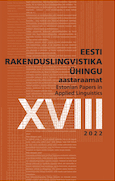KOGNITIIVSED PROBLEEMID ALGAJATE JA KOGENUD TÕLKIJATE TÕLKEPROTSESSIS
COGNITIVE PROBLEMS IN THE TRANSLATION PROCESS OF NOVICE AND EXPERIENCED TRANSLATORS
Author(s): Triin van Doorslaer, Janela Tähepõld-TammertSubject(s): Cognitive linguistics, Finno-Ugrian studies, Translation Studies
Published by: Eesti Rakenduslingvistika Ühing (ERÜ)
Keywords: translation; translation process; cognitive approach to translation; translation problems; Estonian; English;
Summary/Abstract: Translating is a complex cognitive activity that requires diverse knowledge and skills. Depending on this knowledge and skills as well as on the work experience of the translator and on the cognitive abilities of a particular person, the translation process may lead to many problems, which are solved using different strategies. The aim of this article was to find out which cognitive problems arise in the translation process of novices and experienced translators and how they solve these problems. Empirical data was collected by think-aloud protocols. The sample was six people, including three novices (translation students) and three experienced translators (professional experience of at least 10 years). Participants were asked to think aloud while translating a short automotive marketing text (317 words) and record their thoughts with voice recording technology. The participants also filled in a questionnaire. The think-aloud protocols were analyzed with qualitative content analysis. The coding scheme was created using Angelone’s (2010) problem-solving bundle comprising of problem recognition, solution proposal and solution evaluation, and the selected problem indicators proposed by Krings (1986). The results of the study showed that both novice and experienced translators had problems with vocabulary. All of them also encountered uncertainty; however, the novices experienced it more frequently. All participants had problems while translating and there was no difference between the novice and experienced translators. However, the results of the study showed that the novices had more problems in the revision stage than the experienced translators. All translators used information retrieval and reference materials to solve the problems. Differences occurred in the reference materials used, namely the novices used machine translation while experienced translators did not. Also, experienced translators used specialty dictionaries and bilingual corpora and suggested asking a colleague or a client to solve the problem, while the novices did not.
Journal: Eesti Rakenduslingvistika Ühingu aastaraamat
- Issue Year: 2022
- Issue No: 18
- Page Range: 97-112
- Page Count: 16
- Language: Estonian

